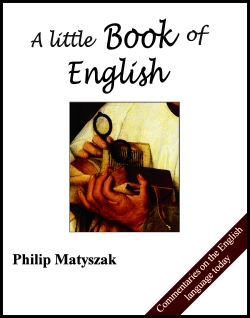|
The earlier Prof blog entries as well as some new articles are now available as a Kindle book from Amazon. We hope you enjoy it.

amazon.com amazon.co.uk
|
| 15 May 2019 | | Are Adverbs real necessary? | English is an odd creation, as are most languages. The language has significant gaps - why for example do we not have a pronoun that means 'We, but not you' - as in 'we, but not you, are going to France this year', or indeed, a pronoun that means 'you, singular' ('thee' did the job until we quite unnecessarily dropped it)?
On the other hand, English has some complex bits that we don't really need, and I'm beginning to wonder if adverbs are not among these. This thought comes as the result of listening to users of American English, especially those of a western persuasion. By and large they disdain the use of adverbs and substitute an all-purpose adjective. By and large their speech is none the less clear as a result.
Consider 'He talks slowly and softly'. All well and good. Now is there any confusion when our westerner drawls, 'He talks slow and soft'? I think not. Overall, removing adverbs makes remarkable little difference. We clear understand what someone is saying, and the meaning stays the same. And it's plain easier.
Where we do still need adverbs is when an adverb is describing an adjective. 'An odd, painted house' is different from 'an oddly painted house', and a 'real slow talker' is different from an imaginary slow talker. However, since westerners use 'real' to mean 'very' there is the possibility of ambiguity here. Not that English is unambiguous anywhere else, you understand. The point is that English adds complexity where it does not need to (subjunctives are a good example) and fails to be clear on some basic stuff.
Of course people have been trying and failing to make English more sensible for centuries. Perhaps we should give up and instead just celebrate the quirkiness of the language, even if adverbs to make it unnecessary complex.
| | | | | 15 March 2019 | | Brave New Words | A Neologism is a 'new word' (that's what Neologism means in Greek). They pop up all the time, because as the world changes we need new vocabulary to describe it. Usually something new comes along – for example a telephone or a squeegee - and the human race comes up with a word for it.
Occasionally though, we get the word first and the actual thing comes along later. This happens particularly with science fiction, because it is the job of sci-fi writers to imagine a new world. Often the words that these writers invent become part of our language, or part of the specialist engineering or scientific field where these inventions come to life. For example, engineers and others often use 'waldos' when they are nowhere near where a job that has to be done. But put your hands into special gloves, and through the internet you can operate a pair of robot hands which do the actual work.
The waldos were first described in 1940 by writer Robert Heinlein, long before the internet was ever operational. Even more remarkable are the 'robot' hands, since 'robot' was first used in a 1920 play called 'Rossum's Universal Robots' by Czech writer Karel Capek.
Given that science fiction is often about space, we should not be surprised when 'spaceships' (term invented in 1894 by writer J.J. Astor) 'blast off' (a term made popular by 1930s sci-fi writers). No doubt 'tractor beams' and 'death rays' will move from fantasy to reality when science catches up with the existing vocabulary.
Other words such as 'android', 'cyberspace' and 'hive mind' all owe their existence to the active imaginations of science fiction writers. My favourite such word was inspired by a boy's action hero of a century ago. His name was Tom Swift, and his fondness for gadgets inspired, among others, Steve Wozniak co-inventor of the Apple computer. Tom Swift's full name was Thomas A. Swift and one of his favourite weapons was an 'electric rifle'. This inspired the modern stun gun called 'Thomas A. Swift's Electric Rifle', or TASER for short. | | | | | 15 January 2019 | | The art of the non-apology | The English often apologize for things they are not sorry for. Bump into a person on the street, and he will tell you 'sorry' in a tone of voice that clearly means, 'Watch where you are going, you idiot.' Likewise when someone says 'I beg your pardon?' in a particular tone of voice, there is neither begging on his part nor pardon required from you. Rather, this 'apology' means 'I am very offended by what you have just said, so I am going to pretend I did not hear it properly. Take this opportunity to fix your mistake, or it's war!'
Government departments and large organizations have been doing this for years. Statements that 'Apologise for the inconvenience' usually have an unheard snigger attached. It's the corporate equivalent of 'sowwy', (usually said in a childish voice) by which an English person signals that he is actually not sorry at all.
The most recent addition to this genre is the 'We are sorry that people were offended by ...'. The beauty of this is that it sounds like an apology but it is not. The statement does not apologise for giving offence, and indeed does not even admit to being offensive. All is that is stated is regret that some people were offended, with a sub-text that some people will get offended by anything.
Of course one can also go the full Churchill. When Winston was ordered by the speaker to apologise for insulting another member of parliament, he replied, 'It is claimed that I called the honourable member an idiot it is true and I am sorry.' He then sat down, adding that the honourable member could punctuate that sentence as he pleased.
| | | | | 15 November 2018 | | Words we should enfeoff* | Language changes. In most cases it doesn't have to, because no-one thinks that Shakespeare was not capable of expressing himself perfectly well. However, there's a lot of Shakespearean language that we don't use today, (fardels, bodkins and so on). Sometimes that's to do so with changing circumstances, but just as often it is to do with fashion.
For example, the word 'heavy' in Elizabethan times could mean 'mournful', or 'painful' in the emotional sense. This is why we still do things with a heavy heart these days. Then that usage of the word was generally dropped until the nineteen sixties when 'heavy' was adopted by the flower-power generation. ('Man, that Ophelia death scene was heavy.')
We have lost many useful words like 'simular' which is somewhere between 'simulated' and 'counterfeit' - as in 'thy simular smile cozens me not'. And come to that how about 'cozen'? It means – used to mean – 'to deceive with smooth lies'. It would be great if, before throwing something at the TV screen, we still could yell, 'Politicians! Pah! Cozeners with intpinsed particoated lies, all of them!'
(Intpinsed: Impossible to untangle)
Particoated: covered with colourful fabric)
In an age when neologisms are popping up all the time, we should really start digging up some of the great words that we unaccountably abandoned a few centuries back. Go coddiwompling through a comprehensive dictionary, and you'll see what I mean.
*Place in our possession | | | | | 15 September 2018 | | These are not the -oids you are looking for | One of the joys of working with English is that there's always something new to discover about the language. Recently I was discussing the use of the word 'factoid' which the BBC was using (perhaps more accurately than intended) to give extra details about a story.
The thing about words ending with '-oid' is that they resemble the thing described by the first part of the word, but they are not the same. So an 'asteroid' is a bright light in the sky, but it is not a star ('aster' in Latin). A planetoid is not a planet, and moving down to Earthly examples, opioids have the effect of opium, but are not opium. Your thyroid looks like a small version of an ancient Greek shield called a 'Thryus', but it isn't.
Likewise factoids are not facts. The word was coined by an American writer to describe things reported in the media that have been repeated so often that everyone believes them to be facts although they are not. Since the misuse of the word 'factoid' as 'an item of interesting trivia' was coined by the media, this second definition of 'factoid' is itself a factoid, which is deliciously recursive.
Once you get into it, it's rather fun finding out where '-oid' words come from. The ending itself comes from Greek 'oiedes' -'shape' or 'likeness'. So, for example, when a medical researcher came upon a substance in the body that resembled (but wasn't) sterol - the stuff that makes up cholesterol – the obvious name was 'steroid'. And so on.
And those droids you were looking for? Well, the Greek for 'man' is 'andros'. So a robot that looks like a man is an 'android'. The short form of android is 'droid'.
QED, or should I say C-3PO?
| | | |
page 1 page 2 page 3 page 4 page 5 page 6 page 7 page 8 page 9 page 10 page 11 page 12 page 13 page 14 page 15 page 16 page 17 |
|
|

